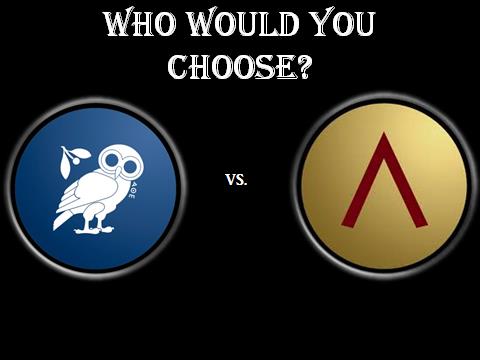By Andrew Rattray
When you think of Sparta, what’s the first thing that jumps to mind? I’m willing to wager that you’re picturing immoveable, impenetrable warriors, the infamous black broth, or perhaps the often-brutal agoge. These things are certainly what first come to mind for me. After all, modern day depictions of Spartan culture portray a hard people who pride martial prowess above all else. Just look to the impossibly chiselled abs in the heavily stylised cinematic retelling of the battle of Thermopylae, ‘300’.
This isn’t just a modern view either. Even at the height of their power the Spartans were seen more as miserable brutes than philosophical thinkers. However, while this reputation isn’t totally unearned, I’m not so sure it’s perfectly accurate. I think the Spartans were less grim realists, and more sarcastic humourists. I should know, I’m Scottish. Let me explain.
We in Scotland have for a long time suffered under a similar reputation of being grumpy, miserable, hard-heads, much like the Spartans. I think this is, in part, due to each nation sharing a neighbour typified by a more refined and well-to-do reputation. Scotland has England, Sparta had Athens. The contrast, and the cultural exports of our neighbours, has painted both Scotland and Sparta with a mischaracterisation that doesn’t necessarily represent our true nature.

If you’ll indulge me, I will recount two quotes on the Spartans and the Scots that demonstrate this similarity even further. Socrates, in Plato’s dialogue Protagoras, describes the hidden cunning of the Spartans: “…they conceal their wisdom, and pretend to be blockheads, so that they may seem to be superior only because of their prowess in battle…This is how you may know that I am speaking the truth and that the Spartans are the best educated in philosophy and speaking: if you talk to any ordinary Spartan, he seems to be stupid, but eventually, like an expert marksman, he shoots in some brief remark that proves you to be only a child.”
Now consider this extract from Chapter One of André Mourois’ biography; The Life of Sir Alexander Fleming: Discoverer of Penicillin. “The English laughed, too, at the absence of humour with which (so they said) these northern immigrants were afflicted. It took hours of hard work, they maintained, to drive a joke into a Scotsman’s head…This picture was very inaccurate. The Scots have their own sense of humour, which is utterly unlike that of the English, who love long stories full of mockery and sentiment. The Scots, on the other hand, delight in a humour which is laconic, dry, vigorous and expressed with a perfectly straight face.”
These two extracts, from two authors over two thousand years distant, perfectly encapsulate the hidden wit of these two cultures which were (and are) so often painted as boorish and ignorant. I consider the Spartans great humourists because I recognise in Spartan discourse this same sense of humour that pervades Scottish culture.
You see, the Spartans were known for what we now call ‘Laconic wit’, a manner of conveying ideas characterised by short, sharp, pithy aphorisms that deliver truth in a satisfyingly minimalistic way. Those of you familiar with the regions of ancient Greece will be one step ahead of me. Laconic wit is named for Laconia, the home of the Spartans. They didn’t just adopt the idea, they pioneered it.
However, where most consider the terseness of the Spartans an extension of their hard, hand-to-mouth style existence, I believe it displays a silly, care free sense of humour. After all, Shakespeare teaches us that ‘Brevity is the soul of wit.’.
One of the most famous examples of this Laconic wit is found in the Spartan response to Philip II of Macedon (the father of Alexander the Great). Philip, after invading Southern Greece and forcing the submission of some of the other prominent City States, wrote to the Spartans asking whether he should come to them as friend or foe. The Spartans reply? “Neither”. This incensed Philip who then wrote, “If I invade Laconia, I shall turn you out.”. Again, the Spartans reply with one word. “If”. In the end, Philip never did conquer the Spartans.
Spartan history is dotted with examples of this sort of sharp, direct, retort but I feel these come across more as ironic, self-aware jibes than true, grim, arrogance. When I think of the Spartan exchange with Philip the first thing that comes to mind is the Scots phrase “Did ye, aye?” an extremely sarcastic way of saying you don’t believe someone, but easy for non-Scots to miss. In the same way, I think the humour of the Spartans has been missed here.
In Book 3 of his Histories, Herodotus recounts another quintessential example of Laconic wit at play. Herodotus describes how a group of Samians, unseated from their homes, petitioned the Spartans for their aid. The Samians, in audience of the Spartans, spoke at length of their troubles to ensure that the greatness of their need was well understood. To this the Spartans replied that the speech had been so long that they had forgotten the beginning and thus could make no sense of the end! The next day the Samians returned to the audience of the Spartans once more with nothing but an empty sack. Holding it out before them the Samians said simply; “The sack wants flour.”. The Spartan response? “You didn’t have to say ‘the sack’”. I find it impossible to picture that final line without imagining its speaker with a well-deserved smirk. This isn’t hard headedness, it’s tongue-in-cheek. In fact, I’d go as far as to say it’s almost silly.
Let’s compare with a Scottish example. Robert Burns, the most famous of all Scottish poets, and figure of the ‘Scottish enlightenment’ of the 18th century, was once at the Greenock quay when a wealthy merchant fell into the harbour. The merchant couldn’t swim and floundered in the water as a crowd gathered. Before long, a sailor dove in, risking his own life, to pull the merchant out and save him from drowning. By way of thanks, the merchant reached into his pocket and produced a single shilling (a meagre sum) much to the dismay of the crowd who found such a small reward to be contemptible. Burns stepped forward to calm the tensions and with a broad smile shouted over the clamour “Please, the gentleman is of course the best judge of the value of his own life!”.
This is what I mean when I say I recognise this same humour in these Spartan stories. Burns’ response couches truth in humour in a way that cuts to the core of the issue. The sarcastic humour of the Scots might be a little more direct, a little more obvious, but to an accustomed ear, one can find the same elements with the Spartans.
So far, history has been kinder to the wit and humour of the Scots than of the Spartans, but in our modern age, full of resurgence of interest in the ancient world, now is the perfect time to deepen our appreciation of Spartan culture for more than just their warrior mentality and stoic resolve. When an Argonian visitor remarked to the Spartan King Eudamidas I that foreign travel risked corrupting Spartan citizens, Eudamidas replied simply; But you, when you come to Sparta, do not become worse, but better.
Perhaps we all can become better if we were to open our mind to new perspectives a little more often.












No comments yet. You should be kind and add one!
Our apologies, you must be logged in to post a comment.